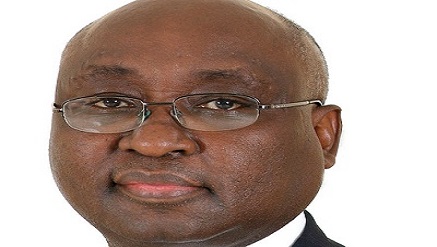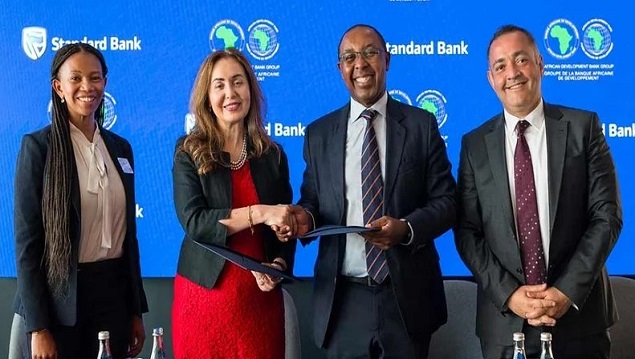E-Financial
AfDB Imstitutes $100Bn for Industrial Development

African Development Bank has instituted a 100 billion dollars infrastructure fund to fast track the continent’s industrial development
.
Dr Ousmane Dore, Nigeria Country Director of AfDB, said that the fund, called “Africa50 Fund”, would be derived from Africa’s resources.
Dore said the idea of the fund was to mobilise domestic savings that already existed in the continent through equity participation from member states and the private sector.
He said the initiative also aimed at delivering infrastructure through a new global partnership platform championing projects to tackle Africa’s infrastructure deficit.
According to Dore, the thinking about how Africa’s development will be financed over the next 50 years in the era of shrinking external donor support led to the establishment of Africa50 Fund.
“The fund, which aims to mobilise up to 100 billion dollars in the first instance, is expected to be a game changer in Africa’s quest for development by relaxing the infrastructure constraints facing the continent.’
“The fund, we believe, remains an answer to all the questions that Africa’s policy makers have always faced when they think of going to international market to raise resources to build roads to finance power sector and all that,” he said.
Dore said that Africa had the resource that could be harnessed to provide finance for the continent’s infrastructure, adding that Africa50 fund would be the vehicle to deliver on such activities.
He said that apart from the initial 100 billion dollars, African countries that had the resources would contribute to the fund.
He said Nigeria provided leadership for the fund in terms of getting to subscribe, while the bulk of the resource would come from all the institutional agencies like pension fund and sovereign wealth fund.
“We do know that Nigeria has a pension fund system that has asset amounting to over 20 billion dollars which she can invest in this fund with some high rate of returns.
“Also, the sovereign wealth fund, which is being set up by many oil and natural resources producing countries, can be tapped in to really compliment this Africa50 fund.
The country director said that most African countries had signified interest to invest in the fund during the bank’s just concluded annual general meeting held in Kigali, Rwanda.
“What we are planning to do in the coming weeks is to do some road shows in some countries we belief to have large pool of savings.
“We are targeting countries like Nigeria, Angola and Ethiopia as well as Equatorial Guinea, Gabon and Cameroon that have built some kind of saving either through their oil and gas resources,” he said.
Dore also said that AfDB was an African institution that understood better the socio-economic challenges of Africa than any other global development institution by undertaking projects that were beneficial to African people.
E-Financial
AfDB, Standard Bank Unite to Support SMMEs and Boost Trade

The African Development Bank Group and Standard Bank Group (SBG) on Monday signed a landmark financial agreement to enhance funding for small, medium, and micro enterprises (SMMEs) and expand trade across Africa.

The agreement includes a R3.6 billion investment in a social bond and a $200 million Risk Participation Agreement (RPA) for Standard Bank of South Africa Limited (SBSA). This initiative strengthens Standard Bank’s lending capacity, ensuring greater access to finance for SMMEs, a critical driver of economic growth and job creation in South Africa.
The social bond investment promotes inclusive economic development, particularly for SMMEs with a turnover below R300 million and loan sizes under R40 million. This financing will support up to 4,000 businesses, helping them scale operations, create jobs, and contribute to economic resilience.
Kenny Fihla, Deputy Chief Executive Officer of Standard Bank Group and Chief Executive Officer of SBSA, welcomed the investment, stating: “This landmark partnership strengthens our ability to support SMMEs, the backbone of South Africa’s economy. With approximately 3.2 million SMMEs accounting for 60% of jobs, ensuring access to finance is crucial. This initiative aligns with our Sustainable Finance Framework and our commitment to financial inclusion.”
In addition to the social bond, the $200 million RPA enhances trade finance across Africa, focusing on Low-Income Countries and Transition States. This agreement enables local banks to increase lending by sharing risk, bridging the trade finance gap, and promoting intra-African trade.
Leila Mokaddem, Director General for Southern Africa at the African Development Bank, highlighted the broader impact: “This collaboration marks a significant milestone in our long-standing partnership and is a testament to our shared commitment to supporting SMMEs’ growth and enhancing trade finance across Africa.
“Expanding financial inclusion and trade opportunities empowers businesses to drive economic transformation and regional integration. The Standard Bank Group remains a strategic partner in our shared vision for economic development on the continent.”
This initiative aligns with the African Development Bank’s Ten-Year Strategy (2024–2033), which prioritises industrialisation, regional integration, and improving the quality of life in Africa. It also supports Standard Bank’s Sustainable Finance Framework, reinforcing both institutions’ commitment to fostering green and inclusive growth.
“We are proud of this transaction, demonstrating our shared commitment to sustainable financing. By supporting businesses, we create long-term economic opportunities and financial resilience,” stated Ahmed Attout, Director of the Financial Sector Development Department at the African Development Bank.
Kenny Fihla reaffirmed the significance of the collaboration: “By providing much-needed capital, we are helping enterprises overcome challenges and thrive. This partnership illustrates the power of collaboration in driving meaningful economic and social change in Africa.”
E-Financial
Analyst Predict Fidelity to meet Recaptalization Threshold ahead of Regulatory Deadline

Fidelity Bank Plc is making impressive strides on its path to fulfilling the recapitalization targets set by the Central Bank of Nigeria (CBN). With a successful first phase of its capital-raising initiative that recorded over 238% over subscription and share price growth of over 100% evidencing a huge surge in investor confidence for the bank.

Following the successful completion of phase 1 of its capital raise, the bank is exceptionally well-positioned to not only meet the regulatory threshold strengthen but also fuel its growth trajectory.
With the recent conclusion of its equity capital raise through a Public Offer and Rights Issue, collectively known as the Combined Offer. The response has been nothing short of extraordinary, with the Public Offer oversubscribed by an astounding 237.92%. This translates to 107,588 valid applications for a total of 23,768,724,000 ordinary shares, amounting to ₦231.7 billion. The Rights Issue also shone brightly, achieving a remarkable 137.73% subscription rate with 6,903 valid applications for 4,407,252,795 ordinary shares, totaling ₦40.7 billion.
Dr. Nneka Onyeali-Ikpe, the Managing Director and CEO of Fidelity Bank, expressed heartfelt gratitude for the overwhelming support from investors, stating, “The positive results recorded in our Combined Offer are a testament to the strength of the Fidelity Bank franchise in the capital market.” Such a robust response not only underscores investor confidence but also reaffirms the bank’s unwavering commitment to delivering innovative financial solutions and sustainable returns to its stakeholders.
Following this remarkable success, Fidelity Bank has secured shareholder approval to launch the second phase of its capital-raising initiatives. This includes a significant increase in the bank’s issued share capital from ₦26.7 billion to ₦36.7 billion. Shareholders endorsed this expansion during an Extraordinary General Meeting on February 6, 2025, approving the creation of an additional 20 billion ordinary shares of ₦0.50 each.
This strategic capital boost positions Fidelity Bank to meet the CBN’s new minimum regulatory capital requirement of ₦500 billion for banks with international authorization by March 31, 2026. This ambitious goal aligns seamlessly with the bank’s vision for sustainable growth and exceptional service delivery, setting the stage for a dynamic future.
Fidelity Bank’s stock performance has further solidified its status as a top contender in the financial sector. From an initial offer price of ₦9.75 per share during the Public Offer, shares soared to a high of ₦21.15 on February 7, 2025, representing an impressive growth rate of over 116%. This positions Fidelity Bank as one of the best-performing financial institutions in the market, with analysts from Apel Asset Limited noting an impressive 80% return on investment for shareholders who have held shares since 2023.
Market analysts project a considerable upside potential of 28.88%, establishing a fair value of Fidelity Bank at ₦23.15 against a reference price of ₦19.50. Such promising indicators not only enhance investor confidence but also position Fidelity Bank as a compelling investment opportunity within the Nigerian banking landscape.
The funds raised from the initial phases of the capital-raising exercises are earmarked for several key initiatives. Fidelity Bank plans to utilize these resources for local and international business expansion, enhancing technology infrastructure, and improving customer service initiatives. This proactive approach showcases the bank’s commitment to innovation and operational excellence.
As the bank gears up for the next phase of its capital-raising initiative, the primary focus remains on achieving its recapitalization targets while consistently delivering value to stakeholders. The bank’s leadership is confident that, with sustained investor support and a robust financial strategy, it will adeptly navigate the evolving landscape of the Nigerian banking sector.
Fidelity Bank’s recent achievements in capital raising signal a pivotal moment in its journey toward strengthening its financial foundation. With robust investor backing, strategic capital allocation, and a clear vision for growth, Fidelity Bank is not just on track to meet its recapitalization target—it is poised to exceed it.
The road ahead promises to be one of sustained growth and innovation, reinforcing Fidelity Bank’s position as a leader in the Nigerian financial sector. As the bank looks toward the future, it remains steadfast in its commitment to fostering strong relationships with investors and delivering on its promise of financial excellence and exceptional customer satisfaction.
Fidelity Bank’s proactive measures and impressive market performance pave the way for a brighter, more prosperous future—one where it continues to lead with integrity and vision in the ever-evolving financial landscape.
E-Financial
SERAP Drags CBN to Court over ATM Fee Hike

Socio-Economic Rights and Accountability Project (SERAP) has filed a lawsuit against the Central Bank of Nigeria (CBN) over the failure to reverse the increase in Automated Teller Machine (ATM) transaction fees.

The CBN had recently announced that ATM withdrawals made at a machine owned by a bank but outside its branch premises will now attract a charge of N100 per N20,000 withdrawn.
ATM withdrawals at shopping centres, airports or standalone cash points, will incur a N100 fee plus a surcharge of up to N500 per N20,000 withdrawal.
This was contained in a signed by Kolawole Oluwadare, deputy director, SERAP, saying the increase creates a two-tiered financial system that discriminates against poor Nigerians who may not be able to afford it.
In the suit number FHC/L/CS/344/2025 filed last Friday at the Federal High Court, Lagos, SERAP is asking the court to determine “whether the decision by the CBN to increase ATM transaction fees is not arbitrary, unfair, unreasonable, and contrary to the provisions of the Federal Competition and Consumer Protection Act 2018.”
SERAP is asking the court for “a declaration that the decision by the CBN to increase ATM transaction fees is arbitrary, unfair, unreasonable and contrary to the provisions of sections 1(c) and (d), 104, 105 and 127(1) of the Federal Competition and Consumer Protection Act 2018, which is binding on the CBN.”
SERAP is seeking “an order of interim injunction restraining the CBN, its officers, agents, associates or any other persons acting on its directive or instructions from enforcing and giving effect to the decision, pending the hearing and determination of the motion on notice for an order of interlocutory injunction filed in this suit.”
In the suit, SERAP is arguing that: “The increase cannot be justified under the Nigerian Constitution 1999 [as amended], the CBN Act, Federal Competition and Consumer Protection Act, and the country’s international human rights obligations.”
SERAP is also arguing that, “The increase creates a two-tiered financial system that discriminates against poor Nigerians who may not be able to afford or pay the increased ATM fees.”
According to SERAP, “The patently unlawful, unfair, unreasonable and unjust increase in ATM transaction fees also inherently contributes to violations of the human rights of socially and economically Nigerians.”
The suit filed on behalf of SERAP by its lawyers Oluwadare and Andrew Nwankwo, read in part: “The CBN is compromising its stated mission to advance the management of the country’s economy, and ultimately, sustainable development.”
“The CBN is also failing to comply with the Nigerian Constitution, the Federal Competition and Consumer Protection Act and the country’s international human rights obligations in the exercise of its statutory powers and functions.”
“The increase in ATM transaction fees ought to have been shouldered by wealthy banks and their shareholders, not the general public.”
“CBN policies should not be skewed against poor Nigerians and heavily in favour of banks that continue to declare trillions of naira in profits mostly at the expense of their customers. The increase in ATM transaction fees would inflict misery on poor Nigerians and contribute to human rights abuses.”
“Imposing exorbitant ATM transaction fees on socially and economically vulnerable Nigerians at a time several Nigerian banks are declaring trillions of naira in profits yearly is manifestly unfair, unreasonable and unjust.”

 General News2 days ago
General News2 days agoSANEF Appoints Uche Uzoebo as New Chief Executive Officer

 E-Financial2 days ago
E-Financial2 days agoFlutterwave Visits Tinubu, Seeks Support to List on NGX

 General News2 days ago
General News2 days agoAgain, Gambaryan, Binance Executive Accuses 3 Lawmakers, NSA of Demanding $150m Bribe

 Telecom2 days ago
Telecom2 days agoGlobacom Continues Upgrade of Network Infrastructure Across Nigeria

 Telecom2 days ago
Telecom2 days agoATCON Warns of Nationwide Telecom Blackout over Diesel Shortage

 News2 days ago
News2 days agoNITDA Inaugurates Technical Working Group to Drive Nigeria’s Digital Sovereignty

 E-Financial2 days ago
E-Financial2 days agoSERAP Drags CBN to Court over ATM Fee Hike

 News2 days ago
News2 days agoNigeria to Witness First Lunar Crescent on 28 February – NASRDA



























